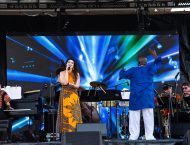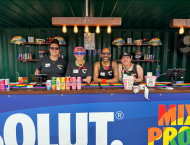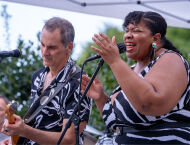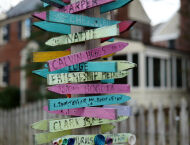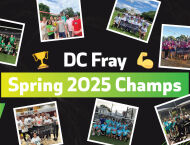Music

New Year’s with St. Paul & The Broken Bones
December 10, 2015 @ 12:00am
Hundreds of artists play 9:30 Club every year, but how many of them can say that they have attended shows at DC’s landmark music venue? Paul Janeway, the dynamic, show stopping front man and namesake of soul outfit St. Paul & The Broken Bones, has not only attended numerous shows at the 9:30 Club—and played a handful there himself—but also says some of his fondest memories involve the club and the District of Columbia.
“When me and my wife started dating, she got a scholarship to get her Master’s at Georgetown,” Janeway told On Tap in a recent interview, “I spent a lot of time in DC and saw a lot of shows at the 9:30 Club. So DC, to me, is this special place where I fell in love.”
Few enjoy as deep a connection as Janeway does with our own 9:30, and that connection makes for more energetic, emotionally involved performances.
The emotional punch of their performances is one of the key elements that has propelled St. Paul & the Broken Bones from anonymity in Birmingham, Alabama, to becoming an in-demand live act in only four years. And 2015 has been quite the year for the group. A year that began on the Cayamo cruise in Florida, saw them open for the Rolling Stones on their “Zip Code” tour and play dozens of festivals and gigs will end when they take the 9:30 Club stage on New Year’s Eve.
Janeway says the group picked DC, and the 9:30 Club specifically, because of the connection they had to the venue. “We had other offers, more money, all of that. But it wasn’t about that,” Janeway honestly admits, “It’s about getting to play DC on New Year’s and getting to play that club, which is such a special place…. I’m sure people already know this but the 9:30 Club is probably the best rock club in the world.”
That kind of earnest connectivity is at the center of St. Paul & The Broken Bones’ live shows. Sure, the goal of most performers is to make some kind of connection with their audience; but their vision is greater than that. “You want people to walk out of there with a smile on their face, feel uplifted in a way, or feel like they’ve had some sort of interaction with something beyond themselves,” Janeway says, more shaman than soul man at this moment, “I know I’ve seen shows that blew me away and felt like a religious experience. That’s how I want our shows to be!”
Soul music, and Janeway’s musical background and performance career, begins in gospel music and the church, specifically the Pentecostal faith. Janeway notes that the Broken Bones’ shows follow an ebb and flow similar to a gospel church service.
“Honestly, I think the good thing is that it [church] can provide hope. There is a joy there,” Janeway says with heartfelt tone, “But church is seen in a way where there are highs and lows. And, to me, there’s not much difference in the way our show goes. To me, if you just do a set of 100 miles per hour all the time, it loses its flavor after a little while. Our sets are very cheerful, very happy, danceable kind of stuff to not danceable, sad…intense, that’s probably the word.”
As for the dancing part, there will be no shortage of that over their two night stint. St. Paul & the Broken Bones play the 9:30 Club on Wednesday, December 30 at 7 p.m. and Thursday, December 31 at 9 p.m., Trouble Funk opens on New Year’s Eve. For tickets visit www.930.com , $35 on Dec. 30 and $55 on Dec. 31.
Read the interview transcript below when Paul talks more about his musical upbringing, being a musician today, and what it was like opening for the Rolling Stones.
For more infomation on St. Paul & The Broken Bones, visit www.stpaulandthebrokenbones.com. Follow them on Twitter @ stp_brokenbones, Facebook @St.PaulandTheBrokenBones and Instagram @stpaulandthebrokenbones.
9:30 Club: 815 V St. NW, DC; www.930.com
On Tap: So the first thing I have to ask about is the name. St. Paul and the Broken Bones is such a provocative band name, where did it come from?
Paul Janeway: From the bass player Jesse, that’s where it came from. The first song we ever wrote was a song called “Broken Bones and Pocket Change” and there’s a line in it that goes “Broken bones and pocket change is all she left me with.” So he decided it was kind of like “all they left me was this band and my money,” so he decided to call “the band” the Broken Bones. He calls me St. Paul because of my church background and so on and so forth. It’s funny; I didn’t want my name it. I lost that battle.
OT: How did the band come together? What united the six of you under the banner of soul?
PJ: Well I grew up listening to it as a child, and I grew up singing in church. It’s always been something I’ve just been around and wanted to do. I kind of sing a certain way: you’re not really gonna be breaking out any Trent Reznor, Nine Inch Nails tracks. It’s just not happening! So it kind of fit. When we started writing songs for this Jesse was like “Why don’t we write songs around your voice, instead of trying to combat that.” And so that’s kind of how it all came about. It kind of happened fairly organically; which is the best way of this happening. Because if it doesn’t happen that way it can be detrimental; eventually it loses its luster. So it’s been good.
OT: I’m not the first and won’t be the last to say this, but your voice has this intense tone that is just pure Otis Redding, Wilson Pickett, and classic soul. Is that natural or is your timbre something you’ve had to work at and develop?
PJ: It’s fairly natural. Obviously, as a singer, you get better as time goes on. It’s always had a rough kind of thing to it and I don’t know why. It’s that hurt in the voice, you know what I mean. I don’t really know: It’s just kind of how I sing. It’s not one of those things where I worked at for years. It just kind of happened and it’s just kind of what I do. I guess it’s just there!
OT: How would you describe the band’s music in relation to classic soul? Is it homage, reimagining, or a modern development on a classic form?
PJ: You know, to me, I think probably the modern classic to that form is a good kind of way…We never set out to be a “retro soul act” ever. It’s not what we were going for or anything. I think Booker T. & the M.G.’s is probably one of the greatest American bands ever. And the Swampers and those guys, those are definitely musical idols and I don’t see that as a negative thing; I see that as a positive thing. So it just kind of formed from there. But I’ve never thought of ourselves as paying homage to anything. We do do some covers every once in a while and those are to pay homage to the kind music we like. But those vary from Tom Waits and David Bowie to Otis Redding and Paul McCartney so its…I mean, we’ve done a Radiohead song before. It’s just one of those things.
OT: What would you say sets it apart? What makes it a “modern” take on soul music? The songwriting? Different things in the music? The delivery?
PJ: In my mind it is basically the songwriting. We try to do things, there’ll be subtle differences. We’re not trying to copy. We’re not trying to go “Let’s sound like this,” it’s just what comes out of us. As we’re all twenty-something’s and thirty-something’s, there’s obviously some modern kind of influences that leak their way on. And definitely will in this next album!
OT: What modern singers would you say impact your way of interpreting soul music and your singing?
PJ: I think someone like D’Angelo is amazing, in a lot of ways…Someone like Erykah Badu. I thought Amy Winehouse was an incredible singer…I’m trying to think…I listened to a band the other day, that I really love, Hiatus Coyote—I think that’s the band’s name—and they have a phenomenal singer. There’s plenty of modern stuff…But those are the ones: D’Angelo and Erykah Badu, people like that I think are amazing and incredible singers. Miguel is a great singer. And I think there aren’t as many great singers as there were back in the day.
OT: It’s funny you mention that. I was talking to Hugh Masekela a couple weeks ago and he said that he thinks “that the great age of innovation is gone, and there is very little originality because of technological prowess today.”
PJ: Right! I think that’s a valid point. I’m not a great piano player but I can do keys on garage band. But’s he’s totally right. Mastering your instrument and mastering your voice, too…we have technology now where it’s cool to auto-tune shit. It just makes you lazy. Kanye can’t sing a lick but he’s got an album when he sings. So can he? Can he not or can he? It’s a different era.
OT: Or we have situations like when your fellow “Tiny Desk” alum T-Pain wowed everyone without auto-tune.
PJ: Exactly! Exactly!
OT: Speaking of the Tiny Desk and DC, how does a soul band from Alabama pick, or come to find yourselves, playing in DC at the 9:30 Club on New Year’s Eve? Of all the places in the country, why DC?
PJ: Well, I cannot think of a better place to be than DC on New Year’s. Because…When me and my wife started dating, she got a scholarship to get her Master’s at Georgetown. She did her undergrad here in Birmingham, and she’s brilliant and got the full ride to study up there. So we started dating almost as she was moving. So we were like “Ah well, this isn’t gonna work.” Two weeks later we ended up missing each other so much that we were just “Alright, we’re gonna have to do the long-distance thing.” I didn’t have much money but you could fly to BWI from Huntsville, Alabama for like $160-170, round trip. So I would do that once in a while. I spent a lot of time in DC and saw a lot of shows at the 9:30 Club. So DC, to me, is this special place of where I fell in love. I really don’t care how other people feel about it: I love it there! Because I have such fond memories there.
OT: It’s exciting for us here, especially, that Trouble Funk will open for you on NYE. Do you or the band have any previous relationship to DC’s go-go music? What is most exciting for you about getting the chance to interact like that?
PJ: I know a little bit about it. So when they said Trouble Funk was doing it we were like…Well first off we were like “Why are they opening for us?” You know what I mean? It makes you feel like sometimes… It’s a huge honor! It’s gonna be cool as shit. I don’t think you can do a better show than that, at least with them. We played with somebody else who kind of had the roots in that…but we don’t know enough about Go-go to comment about it.
OT: You grew up in the church, and that’s where you started singing. Church music, gospel music, is great party music; Go-go music is great party music. How does the celebratory spark of Gospel music come into your performance and into the band? Is that a major influence on how you perform?
PJ: Yeah, in a way. It’s definitely a major way in how I do shows. Honestly, I think the good thing is that it [church] can provide hope. There is a joy there. But church is seen in a way where like there are highs and lows. And, to me, there’s not much difference in the way our show goes. You want people to walk out of there with a smile on their face, feel uplifted in a way, or feel like they’ve had some sort of interaction with something beyond themselves. I know I’ve seen shows that blew me away and felt like a religious experience. That’s how I want our shows to be! I don’t exactly how you do that: but there’s something about it that happens at church and it happens at shows. It’s happened to us at shows where we’re on stage and you go “Woah, this is a moment.” Somebody once told me that spiritualty, religion, that kind of thing is just that lump in your throat; and that’s how I view music and other things.
OT: Is that what satisfies you and the band or excites you as performers? When do you, or other members of the band, feel satisfied that they’ve given a great show night-to-night?
PJ: It varies, it can be various things. We’ve had shows where the audiences…When we played the Ryman, we opened up for somebody and we got three standing ovations. In those moments you know “This is special.” At different times we’ve just had to let the people in the audience finishing cheering; that’s amazing and that’s pretty special. Sometimes you can see people in the audience having an emotional reaction and you go “Woah, OK. This is serious business.” But in the next song you’re like dancing around. It’s a weird thing.
OT: I know that I would have killed to see you open for the Rolling Stones this summer. What was that like? Joining the Stones on that stage?
PJ: I mean…It was funny. We were on the plane flying to Buffalo, which is one of the places we opened up for ‘em. You know how, sometimes on planes, those conversations strike up? “What are you doing in Buffalo?” “Oh I’m going to play a show,” and this guy was going down the list of venues and everything and I was like “No, no.” “So where you playing?” I said, “The football stadium.” And they were just like “WHAT?” Then you have to tell them, “Oh yeah, we’re opening up for the Rolling Stones,” which is crazy. It was incredible. I don’t know, in terms of opening gigs, what you do from there. It was unlike everything we’d ever done, because it was a football stadium. We’d played big crowds but that’s…that’s just different. And, not only are you playing for the crowd but you look to your left and Keith Richards is watching your show with Charlie Watts. You’re sitting here going, “Don’t be a loser right now. Don’t mess this up.” It was really kind of weird because you’re sitting over there and you’re sitting over there and you see them. You see Ronnie and Charlie and al them and you’re just like “OHMYGOD.” That was really cool. We were flattered that they came out and watched the show and stayed for the whole show. And I got to talk to Keith and Ronnie and got to hang out a little bit and got to meet Mick…It was incredible, I’m not gonna lie. I don’t know what you do from there. We’ve done this so… Laughs There you go!
OT: What do you think the biggest surprise is for people who have never seen you live?
PJ: You know, I think the thing is I don’t think they expect me to sound and sing the way I do. Now, that’s slowly dissipating because people know who we are a little bit more; which is great! I also think, to me, people get surprised about “This is a real band!” There’s no software on stage! I kind of like that, you know? I think that’s happening a bit more rarely now than back in the day. I think another thing that kind of surprises me is how low shows can get. It surprises us that we can get shows so low and people are still attending. That’s usually what surprises me
OT: What do you mean by low?
PJ: Just kind of low energy; and just kind of sad, you know? And what’s weird is that it gets dramatic and very sad and people don’t know what to do: “Woah, It just got super serious!” And it will get dead silent sometimes. To me, if you just do a set of 100 miles per hour all the time, it loses its flavor after a little while. Our sets are very cheerful, very happy, danceable kind of stuff to not danceable, sad…intense, that’s probably the word.
OT: Is there anything else you want our DMV area readers to know, especially as it applies to the upcoming shows?
PJ: I guess not. It’s gonna be a good time. I’m sure people already know this but the 9:30 Club is probably the best rock club in the world. That’s coming from us who’ve played a ton of shows! It’s a real special place. We had other offers, more money, all of that. But it wasn’t about that. It’s about getting to play DC on New Year’s and getting to play that club, which is such a special place.

